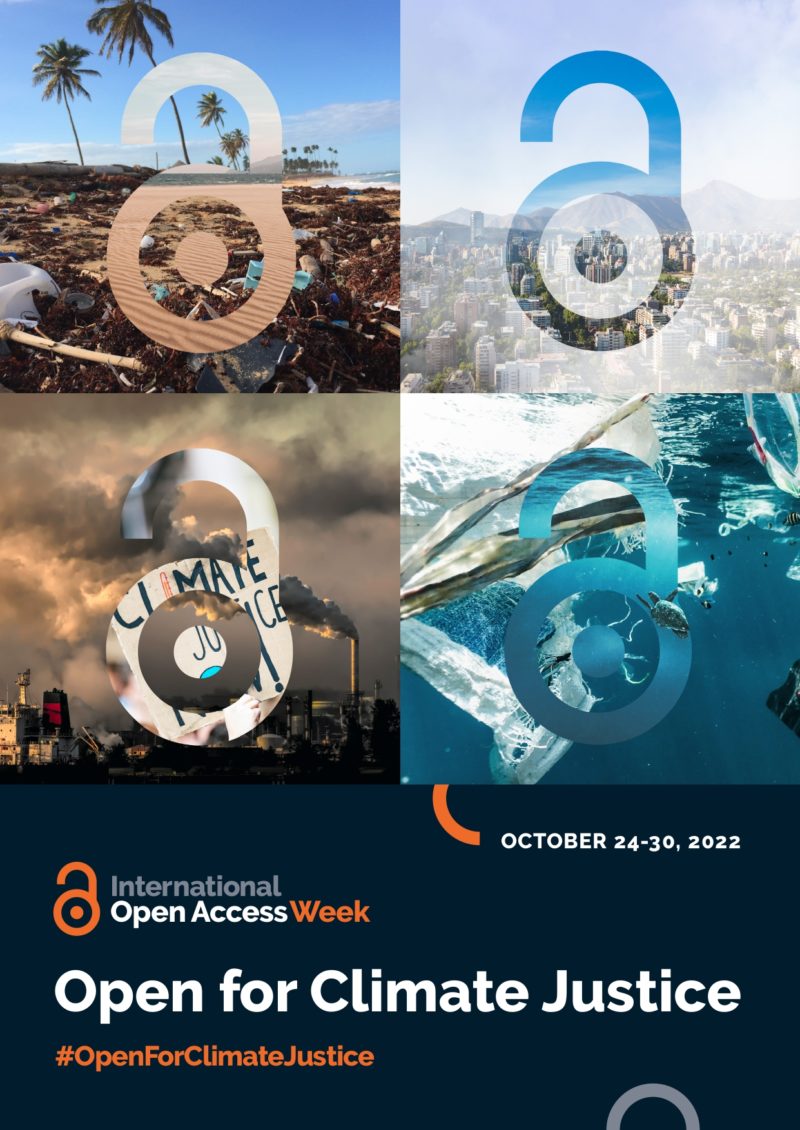The Open Access Week 2022 will be held from October 24th to 30th this year centred on the topic “Open for Climate Justice”.
The climate crisis has occupied a fundamental space on our agendas, bringing together an extensive community of experts looking for a solution to a problem that threatens the sustainability of our planet and our survival as a species.
Following UN statements, to speak of climate justice is to recognize that its impact “will not be borne equally or fairly, between rich and poor, women and men, and older and younger generations. “ Open science is key to removing barriers and promoting greater knowledge sharing. Openness is fundamental to the development of policies and behaviour change that allow for an effective and balanced response to climate change issues.
Over the next week researchers, scientists and librarians from around the world are dedicated to promoting actions related to the open science movement. There are many events available, with free access that only require advance registration. You can consult all events on the following page: https://www.openaccessweek.org/events
Here is a suggestion of some important events, directly related to the theme of the Open for Climate Justice:
Open Access and Transformative Agreements: What’s Next?
- Melbourne, Australia – RMIT Universit (Tuesday, October 25, 2022 –
Join our expert panel in a discussion on the role, advantages, and alternatives of transformative agreements in the academic publishing area
ToxicDocs and A People’s EPA: Advancing Environmental and Climate Justice through Interdisciplinary Research and Open Access Initiatives
- College Park, United States (Tuesday, October 25, 2022 –
In this virtual panel presentation in honor of “International Open Access Week: Open for Climate Justice,” Dr. Jessica Varner (University of Southern California) and Dr. Merlin Chowkwanyun (Columbia University) come together to discuss their unique interdisciplinary research in the intersections of environmental history, public health history, and industrial pollution, and the ways in which their research both relies upon and generates open-access information. The panel will be moderated by Dr. Philip Cohen (University of Maryland).
Dr. Varner’s and Dr. Chowkwanyun’s innovative work led to the creation of two resources which will be highlighted during the session. Toxic Docs, a project based at Columbia University and the City University of New York, is a dataset and website that contains millions of pages of once-secret corporate documents about asbestos, polyvinyl chloride, benzene, silica, and lead. A People’s EPA is an extensive website that provides a straightforward public history of the U.S. Environmental Protection Agency’s (EPA’s) programs, explains how the EPA works, and provides data and tools for users to explore and track the EPA in greater depth.
The researchers’ passion for making information and data about the environment and industrial pollution openly available can serve as inspirational examples for others who wish to advance climate justice in their communities.
This virtual event is co-sponsored by the UMD Libraries and the UMD School of Architecture, Planning & Preservation.
https://umd.libcal.com/event/9767920
How to find hope in a Climate Crisis
- Lancaster, England (Tuesday, October 25, 2022 –
Matt Sowerby is a writer, poet and activist who is currently working on a non-fiction book titled ‘How to Find Hope in a Climate Crisis. As part of Open Acess week, Matt will be discussing their work in the Library exhibition and events space as well as reading poetry.
This event is open to all Lancaster staff and students and members of the public.
https://lancaster-uk.libcal.com/event/3943513
Open for Climate Justice: Conversations with Columbia Climate School Researchers
- New York, United States ( 02
The term “climate justice” reflects an explicit acknowledgement that the climate crisis has far-reaching impacts that are most often felt by communities with relatively few resources. These same communities often lack the means and the access needed to produce, disseminate, and use knowledge around the climate crisis. Openness in research on climate can create pathways to more equitable knowledge sharing and serve as a means to address the inequities that shape the impacts of climate change and our response to them. This panel discussion will highlight how “openness” factors into the work of Columbia researchers and their connections with the climate justice movement. With Kytt MacManus, Marco Tedesco, and Alex de Sherbinin.
Open for Climate Justice: Conversations with the Earth
- Framingham, United States – The Massachusetts Department of Higher Education OER Advisory Council & Framingham State University (Thursday, October 27, 2022 –
Larry McKenna, Associate Professor and Chair Dept. of the Environment, Society and Sustainability at Framingham State University, will speak briefly about his experience writing his new, openly-licensed, ROTEL grant-funded climate change textbook ‘Conversations with the Earth’, then lead an interactive Q and A session for the remainder of this 45-minute session. Professor McKenna says “…there’s positive news here. We still have the power to stop the worst consequences of climate change. We have agency. And we can do it-we must do it-in our lifetimes. ROTEL will allow Conversations with the Earth to bring the science, the policy and the ethics of climate change to a wide audience.”
https://framingham.libcal.com/event/9752959
Climate Justice Talks
- Amsterdam, Netherlands (Thursday, October 27, 2022 1 12
Open for Climate Justice is the theme of Open Access Week 2022. We address the unequal access to knowledge about the climate crisis between various groups of people and stimulate the sharing of knowledge and collaborations within the global climate movement.
The effects of climate justice have an enormous impact on everyone – but the impacts are ‘not be[ing] borne equally or fairly, between rich and poor, women and men, and older and younger generations,’ as the UN notes. These imbalances of power affect communities’ abilities to produce, disseminate and use knowledge around the climate crisis. Openness can create pathways to more equitable knowledge sharing and serve as a means to address the inequities that shape the impacts of climate change and our response to them.
Sharing knowledge is a human right and a tackling the climate crisis requires the rapid exchange of knowledge across geographic, economic and disciplinary boundaries.
The VU University Library invites speakers from various fields to illustrate the importance of open access publishing for climate justice. This event is part of the international Open Access Week 2022.
Speakers:
Stephan Okhuijsen – “The big step from Open Access to Public Awareness”
Iris Veerbeek – “The Use of Wild Pedagogies in the Anthropocene”
Sanli Faez – “The Need of Open Hardware for Climate Justice”
David Rosatti – “The VU Climate Law Clinic as an initiative of shared legal knowledge for transnational climate justice”
https://vu-nl.libcal.com/calendar/infoworkshops/OA
Climate Justice for OA Week Research Funding Webinar
- Stockholm, Sweden (Thursday, October 27, 2022 03 03
We like to talk about research funding, and we’re passionate about Open Access. Join us during Open Access week 2022 as we pay tribute to this year’s theme “Open for Climate Justice” with guest speakers Dr. Priya Donti from Climate Change AI and Dr. Claire Monteleoni, Editor-in-Chief of the Open Access journal, Environmental Data Science, Cambridge University Press and co-founder of Climate Informatics.
This free webinar hosted by scientifyRESEARCH is intended for researchers who are working in climate-related fields. We will discuss the importance of Open Access for solving climate related challenges, present information on funders with excellent global funding initiatives and introduce you to our research funding database at scientifyRESEARCH.
Climate Change AI (CCAI) is a global non-profit that catalyzes impactful work at the intersection of climate change and artificial intelligence. Since it was founded in June 2019, CCAI has been instrumental in establishing climate change as a key area of impact for machine learning, and has inspired, informed, and connected thousands of researchers, engineers, entrepreneurs, investors, and policymakers across the globe.
Climate Informatics is an open community interested in research combining climate science with approaches from statistics, machine learning and data mining.
At scientifyRESEARCH, our mission is to help researchers secure research funding and our vision is for a world where the best research and the most promising researchers are funded. We believe that the best research can only happen if we have a diversity of ideas. We believe that the complexity of the challenges that we face today as a society, requires large-scale collaborations. We also believe that fair and effective research funding starts with all qualified researchers having better access to research funding sources.

